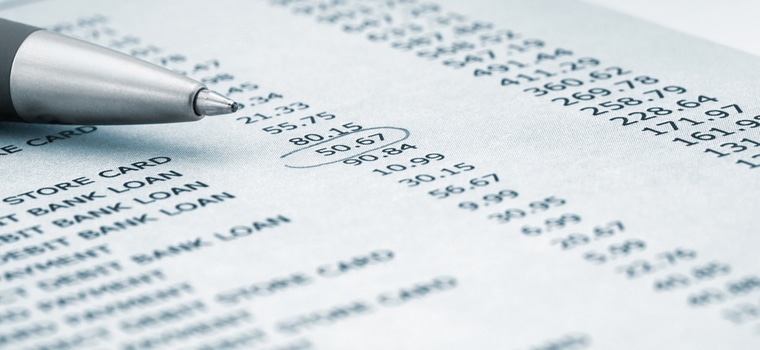A bank statement is a record of all transactions made on a bank account in a given period, usually a month. The statement period may or may not be synchronized with calendar months. Some banks may mail you a paper statement, others may allow you to opt for an online statement.
It’s important to review your bank statements carefully. Your bank statement will help you to monitor your spending and understand where your money is going. It may also help you spot errors or fraudulent charges. Bank statement entries often contain the first signs of identity theft.
What’s in Your Bank Statement?
A bank statement is a record of all a bank account’s transactions during a specific period of time. It will usually contain the following items:
- Bank Information
- Your Personal and Account Information
- The Statement Period
- Starting Balance
- Deposits
- Withdrawals or Payments
- Interest Earned
- Fees Charged by the Bank
- Ending Balance
- Instructions For Reporting Errors or Disputes
The balance and transaction information may be arranged in chronological order, with the beginning balance at the start, the transactions arranged by date, and the closing balance at the bottom.
How Can You Get Your Bank Statements?
Most banks will give you a choice between mailed paper statements and online statements. Some banks, especially online banks, may not provide paper statements unless you specifically request them. Check your statement options when you open your account.
Paper statements will be mailed to your address of record. Some banks mail them automatically, some offer them as an option. Some banks may charge a fee for paper statements.
If you choose paper statements, make sure your mailbox or mail delivery system is secure. The information in a bank statement can be stolen and exploited. If you don’t receive a statement, contact your bank and verify that it was sent. If a statement is missing you may wish to discuss additional security measures with your bank.
Online statements may be sent to you by email. You may also be able to access them through your bank’s app or website. You may need to create a username and password to reach your account details. Use a secure password and change it regularly. Always log out of your account when you’re finished using it.
Always secure your financial records, whether physical or electronic. Protect your financial records online or on your computer with secure passwords and security software and keep paper records in a secure location.
What Should You Do With Your Bank Statement?
Your bank statement is an important tool that can help you understand your finances, spot spending that you may want to reduce and identify costly mistakes, or even signs of identity theft.
When you get a bank statement you should take these steps:
- Reconcile your account. Compare your statement with your records and make sure everything adds up.
- Look for possible mistakes. Errors can always happen, especially if you are using a debit card for transactions. Spotting mistakes can save you money.
- Look for entries that you don’t recognize. It might just be something you forgot, but it could be a sign of identity theft.
- Report any discrepancies. If there are issues with your statement, follow the instructions for reporting them.
- Keep your statement on file. Your bank statements are important financial records. You may need them someday.
Be sure to review your bank statement as soon as you receive it. Many banks offer a limited time window for reporting problems.
You may wish to compare your bank statement with your budget plan. You might see places where you’re going over budget or types of spending where your budget doesn’t match your actual needs.
Why You Should Keep Your Bank Statements?
You should maintain a record of your bank statements. Paper statements should be kept in a secure file. Electronic statements should be backed up or uploaded to cloud-based storage, so they won’t be lost if your hard drive dies. If you dispose of a paper statement, shred it.
Banks are required to keep statement records for five years. Many banks allow free access to recent statements, but you may have to pay for each copy you get of an older statement. Statements more than five years old may not be accessible at all.
Your bank statements are an important part of your financial history. Many lenders and potential landlords ask to see bank statement records, especially for self-employed borrowers. Bank statements may be needed for a tax audit, divorce, or another legal issue.
Conclusion
Your bank statements provide a detailed record of your financial transactions. They are an important tool for tracking your spending, protecting yourself from error and detecting fraud. They provide a long-term record of your financial life and can be used to verify your creditworthiness. Always review your bank statements carefully when you get them, and always keep them for future reference.




